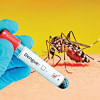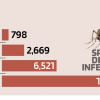Dengue and its ramifications in student dormitories

Starting from April last year, Bangladesh encountered its deadliest outbreak of dengue with a total of 321,179 recorded cases in 2023. Dengue fever generally peaks around the rainy season in Bangladesh. As such, highly populated areas face a greater risk of a dengue epidemic. This is especially bad news for students spending much of their time in close quarters with their peers, and those living in residential facilities are especially vulnerable.
The dengue situation in student dormitories
The dengue outbreak may affect students residing in dormitories disproportionately compared to regular students if proper standards are not maintained. Aedes mosquitoes responsible for the spread of dengue thrive in artificial containers and still waters. That's why, cautionary measures with proper knowledge of the characteristics of Aedes mosquitoes must be adopted by both students and authorities.
"While the numbers of dengue cases aren't severe, we do have a lot of mosquitoes in our hostels because of the trees and hills around our campus. So, people are sick most of the time with fever or cold," says Humayra Adiba, a second-year MBBS student at Chittagong Medical College. "The number of cases is higher in the dorms because cleanliness isn't maintained properly. There's water lying around here and there, especially in the bathrooms, which makes for the perfect breeding ground for mosquitoes."
The mosquito situation is far more bleak at Bangladesh University of Engineering and Technology (BUET), according to Tahzib Rayhan Himadry, a student of Chemical Engineering currently residing in the Suhrawardy Hall.
"The number of dengue cases is shocking," says Himadry. "Most of my friends from the dorms suffer at least once or twice during the dengue season, and my roommate was ill from dengue for nearly a month and a half this year. This affects the students greatly as missing classes often leads to a dent in our academic results. This often discourages students from seeking medical care. To make matters worse, most of the dorm students aren't from Dhaka, so they rarely inform their families about their condition."
Rubaiya Ahmed*, a resident student of Shaheed Suhrawardy Medical College speaks of similar conditions. "Last year, most of the girls in our hostel contracted dengue from June to November. Although the situation is better this year, as I haven't heard of anyone catching it yet, sufficient steps aren't taken in the residential halls until the situation gets dire."
Of course, some universities are faring better than others in this regard, especially if proper precautions are taken. Mehrin Ahmed*, a fifth-year student of Armed Forces Medical College, talks about the precautions taken by the authorities and subsequently, low numbers of dengue afflictions. "We have a lake within our campus premises. However, we have adequate protection against mosquitoes alongside anti-dengue campaigns once or twice every year. Authorities also ensure that students aren't letting water accumulate anywhere."
What can be done
The attempt to prevent dengue must be taken both by dorm authorities and the students themselves. Himadry informs that the authorities in his dormitory are quite proactive in anti-dengue activities. "Mosquito repellents are being sprayed regularly and notices are being put out to create awareness. The authority even hired staff to supply food and medicines to the sick students in their rooms, and the teachers are considerate when it comes to class tests."
Common preventive measures like mosquito repellents may also be ineffective due to incorrect uses. To properly utilise incense extinguishers, the windows and doors to every room within the building must be closed to keep the mosquitoes out. Otherwise, it's likely to be counterproductive as mosquitoes will try to escape the smoke by taking refuge within the rooms.
Students should also try to maintain proper regulations by protecting themselves from mosquito bites by using insect repellent lotions and sprays, mosquito nets etc, and making sure that water doesn't accumulate in artificial containers in surrounding areas.
Mehrin* mentions how she and her friends combatted dengue for the last few years. "We made sure to keep opening our doors to a minimum during the peak hours – dusk and dawn. We also hung a mosquito net over the balcony door attached to our room. This helped keep the mosquitoes away."
Practising such measures may lower the chances of contracting dengue, but if it proves insufficient, medical care should be sought out immediately. High fevers, headaches, nausea, joint and muscle pain etc are some symptoms of dengue. There are other symptoms of this viral disease that everyone should watch out for, especially if there's a dengue patient in your vicinity.
As a student, it might feel like visiting the doctor and resting may affect your academic performance, but it's important to identify the disease early and act upon it. Speaking to faculties and visiting the medical centre of your respective university will also aid in rescheduling exams and deadlines, so you must prioritise your well-being.
Zabin Tazrin Nashita is a student of Islamic University of Technology.

 For all latest news, follow The Daily Star's Google News channel.
For all latest news, follow The Daily Star's Google News channel. 









Comments